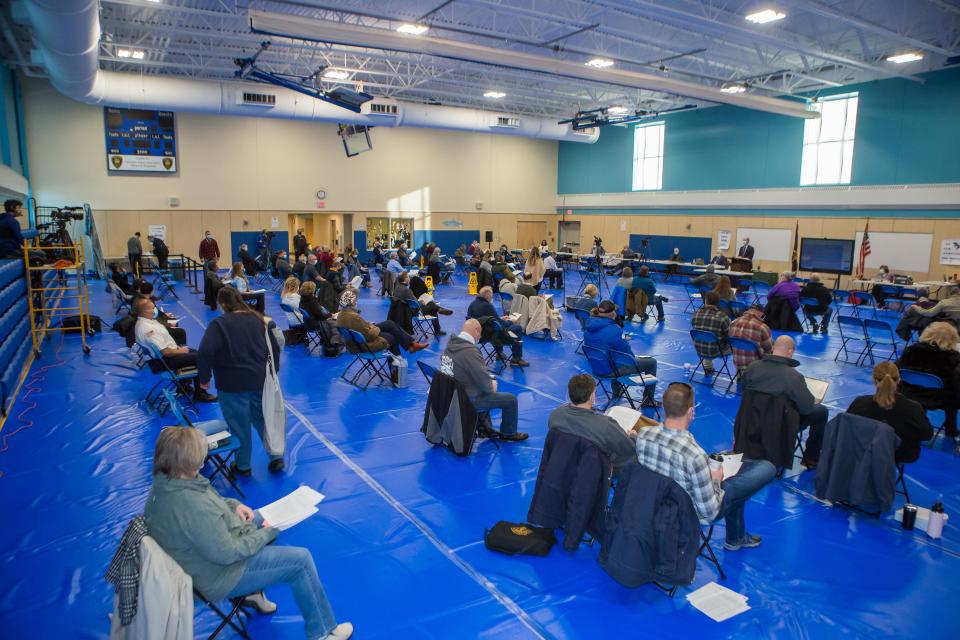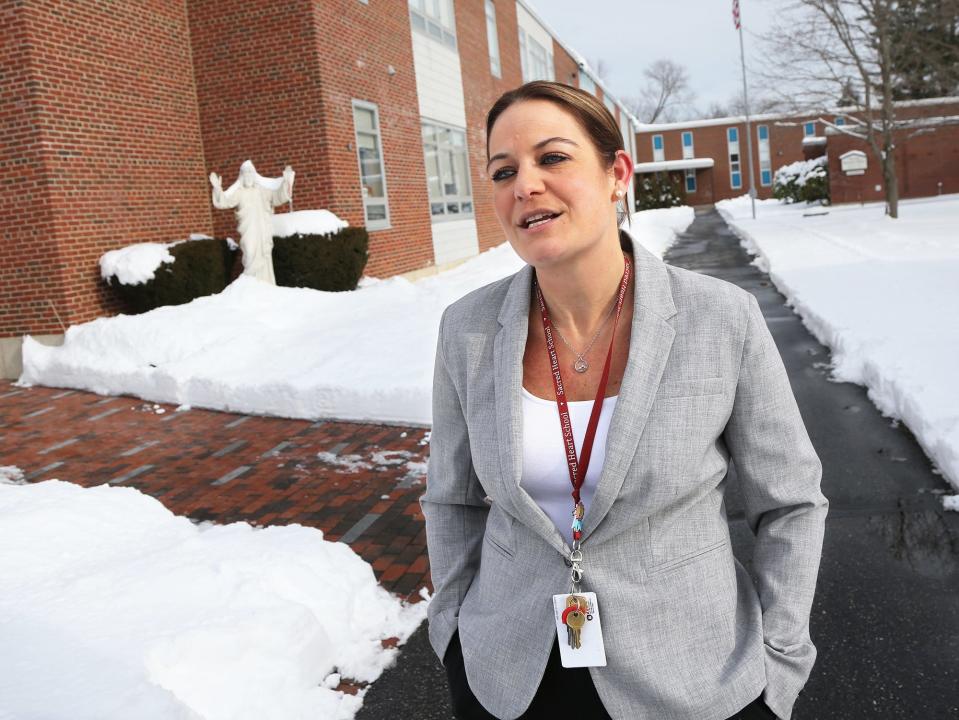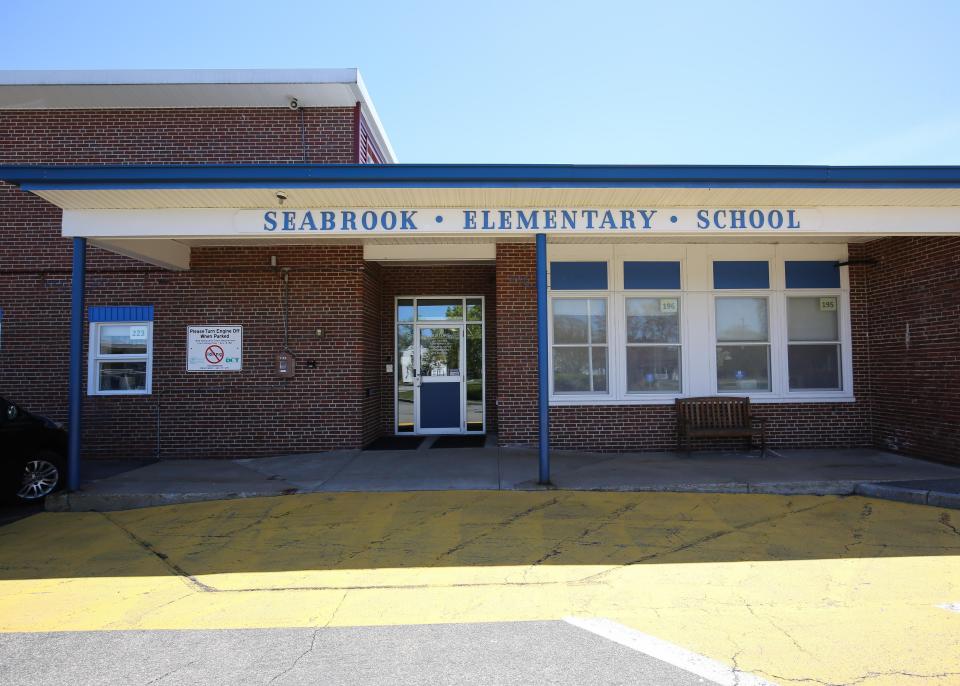Town Meeting 2024: Hampton budget under fire, Seabrook eyes SAU 21 withdrawal
Hampton area voters will weigh in this week on town budgets, capital projects, and other questions impacting their towns during the first half of Town Meeting, known as the deliberative session.
Towns and school districts, like Hampton, Hampton Falls, North Hampton and Seabrook, have deliberative sessions because they adopted Senate Bill 2. It's similar to a traditional New England Town Meeting, the only difference is actual "yeas" or "nays" are done out of the spotlight and in the voting booth on March 12.

Why are deliberative sessions important?
What goes on the ballot is determined by what happens at these sessions.
At the deliberative session voters can debate, make amendments to the wording of an article (except for zoning amendments and as long as it doesn't change the intent), and, yes, potentially even “zero out” a money warrant article. Because money-related warrant article amounts can be brought to $0, residents at deliberative sessions can effectively vote down a spending request before it reaches the majority of voters at the polls.
Here is a look at the top warrant articles on the ballot in Hampton, Hampton Falls, North Hampton and Seabrook.
Hampton resident looks to increase 'transparency' in budget process
A Hampton resident is calling for more transparency and clarity when it comes to town spending.
Joe Torelli has filed four citizens' petitions to go before voters in response to what he calls last year's "bulky warrant articles and lack of clarity."
One article calls for the cost of each money warrant article to be shown based on a $400,000 home valuation. Currently, costs are shown per $1,000 of assessed home valuation.
"I was mortified in my second year of participation that the amount of money that is shown in spending articles is shown per $1,000 valuation," he said. "… (Voters) have no idea (what the actual cost is).
Torelli said his neighbors were "outraged" when they opened their tax bill in January due to the spending approved at the 2023 Town Meeting.
Two articles revolve around the use of the town's unassigned fund balance. One would clarify that when the fund is used to fund projects that the warrant article stipulates "there is no new tax impact" and that it is "funded from excess property taxes collected in previous years in the unassigned fund balance." The other article calls to abolish the unassigned fund balance and cap it at 15% as an emergency reserve.
"Surplus funds over and above the 'emergency reserve' 15% would be refunded to property taxpayers annually as a physical check refunding what was overpaid," the warrant article states. "The town moderator will announce these values to taxpayers during the annual town deliberative session identifying the tax refund for that year."
The last article he filed calls for the town to adopt a zero-based budgeting approach, a method of budgeting in which all expenses must be justified for each new budget year.
This year, voters are being asked to support a $34.8 million town budget, an increase of $1,711,457 or 5.16% over the 2023 budget. Also, on the 40-question ballot is a $2.5 million bond request to replace the sewer on Ross Avenue, Kentville Terrace, and Charles Street and three new contracts for town employees, public works and Fire Department supervisors.
The town's deliberative session will be held Saturday, Feb. 3 at 8:30 a.m. in the gymnasium of Hampton Academy.
Hampton’s dilemma: Should public money go to a private religious school?
Hampton School District
The Hampton School District is asking voters support a $28.8 million operating budget. Also on the ballot is a citizens' petition request to pay $52,521 for student benefit services to Sacred Heart School in Hampton.

The school deliberative session will be on Monday, Feb. 5, with a snow date of Feb. 7 in the auditorium of Hampton Academy at 7 p.m.
Winnacunnet Cooperative School District
Voters will be asked to support Winnacunnet High School's proposed $33.1 million budget, an increase of $2,133,288 or 6.88 percent. Driving the increase is special education and transportation costs as well as health insurance.
“If those three costs were removed,” said Matthew Ferreira, associate superintendent for finance and operations at SAU 21, “the overall budget increase would be 1.44 percent.”
All the school districts in SAU 21 – Hampton Falls, North Hampton, Seabrook and Winnacunnet – will vote on a new four-year contract with the Seacoast Educational Support Personnel Association.
Ferreira said many support personnel earn less than the starting wage at fast-food establishments. That’s because paraprofessionals in SAU 21 start at only $15 an hour, he said, rising to $19 an hour only after 11 years.
The new contract would increase hourly wages by $2 in the first two years and just $1 in years three and four, and it improves the health care benefits offered, Ferreira said.
The Winnacunnet School District deliberative session is Thursday, Feb. 8, at 7 p.m. at Winnacunnet High School.
Seabrook looks to ban cannabis shops
The Planning Board is offering an amendment to the town’s zoning ordinances to prohibit the sale of marijuana in town.
Currently, in New Hampshire, the sale of recreational marijuana is illegal, but there is a bill in the Legislature to change that.

Another zoning amendment, however, would allow non-profit “alternative treatment centers” that could dispense cannabis as prescribed by qualified caregivers to qualified patients.
Voters are also being asked to support a $8.2 million bond to develop new water sources on Stard and Weare roads and create the infrastructure to pump the water to the water treatment plant on Route 107.
If passed, according to Town Manager Bill Manzi, Seabrook’s water supply would be secure for decades.
Also on the ballot is a $6 million bond to complete the second phase of a much-needed upgrade to the town's sewer plant.
The town’s proposed budget is $31,521,401, a 5.24 percent, or $1.5 million, increase over the current budget, Manzi said.
The warrant also requests approval for a new, two-year contract for the firefighters’ union, however, this new contract calls for no raises for Seabrook’s 20 full-time emergency responders.
“Basically,” Manzi said, “this contract just keeps what they have.”
However, the Fire Department is asking in a separate warrant article to hire eight new firefighters/EMTs, at a cost of about $950,000 in the first year and $1.27 million in subsequent years.
The town's deliberative session is at 7 p.m. on Tuesday, Feb. 6, at the Community Center.
Seabrook wants to leave SAU 21: Here's why and what's next
Seabrook eyes break up with SAU 21
The town’s School Board is asking voters to form a committee to determine whether Seabrook should withdraw from School Administrative Unit 21.
The board voted 4-1 in November to start the formal process of breaking away from the SAU consisting of Hampton Falls, North Hampton, South Hampton and the Winnacunnet Cooperative School District.
SAU 21 Superintendent Meredith Nadeau said the Seabrook board has expressed concerns about student achievement, as well as budgetary costs over the years.

In recent years, Seabrook parents have repeatedly expressed concern about the students' lack of proficiency in academics, according to annual state achievement test scores. Further, many parents have questioned when students, who have earned good grades during their Seabrook school years through middle school, find themselves behind their peers academically from other communities at Winnacunnet High School.
According to SAU 21 Finance Superintendent Matthew Ferreira, Seabrook represents about 30 percent of the shared costs of the SAU 21 budget, or about $650,000, annually.
If voters approve the committee, state law specifies its membership, how and when it meets, the issues it must investigate, what’s to be included in its report, and how to go about developing a plan to create a new SAU, should it recommend withdrawal.
Also on the ballot, is the school district's budget of $17.9 million budget, which is $593,764, or a 3.4% increase over the prior year.
The warrant also requests about $155,000 for salary and benefits for a district social worker, an existing position previously funded via a grant, as well as $380,000 for a new roof and about $17,000 to support Seabrook students who attend Sacred Heart School.
The school deliberative session is at 5 p.m., Monday, Feb. 8, at the Seabrook Middle School gym.
Hampton Falls looks to regulate fireworks, vape stores
Hampton Falls voters will deal with 27 warrant questions on the ballot, with 17 offered by the Planning Board in attempts to shape the type and look of businesses in town.
Included in the proposed zoning articles are those that would regulate the sale of fireworks, vaping materials and short-term residential rentals (less than 30 days), as well as the types of signage allowed in town.
The proposed operating town budget is $3.59 million, or about a 7.5 percent ($252,529) increase over this year’s budget.
A warrant article also requests changing polling hours from 8 a.m. to 8 p.m., to 8 a.m. to 7 p.m.
The town deliberative session is at 7 p.m., Tuesday, Feb. 6, at the Town Hall.
Hampton Falls School District
Hampton Falls School District’s proposed $7.49 million budget, represents a 5 percent, or $356,628 increase. Along with transportation and insurance increases, the rise is driven by a required out-of-district special education placement costing about $98,000.
The Hampton Falls School Board is also requesting $50,000 to hire a part-time school resource officer for Lincoln Akerman School.
The school deliberative session is at 6 p.m., Tuesday, Feb. 6, at the Town Hall.
North Hampton looks to retain employees
North Hampton has two articles on the ballot that officials say are needed to retain and attract town employees.
Select Board and Budget Committee member James Sununu said both articles are in response to the difficulty in hiring and retaining qualified municipal employees in a competitive labor market.
Article 6 is a new three-year contract with the town’s firefighter’s union. The contract includes raises to wages, fringe and other costs, such as longevity bonuses. Costs include $150,169 in 2025, $77,653 in 2026, and 62,899 in 2027. Also requested is $150,169 in 2025, according to the question, for related increases in 2025 paid to current staffing levels under the existing contract.

Article 7 revises the current police/DPW union employee contract to represent raises negotiated in 2024. These revisions represent the town’s hope to attract the candidates needed to fill an extensive list of vacancies at the department, as it rebuilds following a large exodus of officers last year. The costs include salary, benefits and other cost increases that would equal $168, 637 for fiscal 2025, plus the same amount for current staff under the existing contract.
Also on the ballot is the town's proposed operating budget of $9.6 million, which is 7.4 percent, or $661,781, over the current budget.
Most of the increase relates to a whopping 25 percent increase in the town’s health insurance premiums.
“And it would’ve been higher, but 25 percent is the cap,” Sununu said. “Health insurance is by far the largest cost increase in the proposed budget.”
Other cost hikes include debt service on bonds issued to build the new public safety building and library and a hike in hydrant fees from Aquarion Water Company.
The town deliberative session is at 8:30 a.m., Saturday, Feb. 3, at the Town Hall.
North Hampton School District
Voters are being asked to support a $10.1 budget, which is just less than one percent above the current budget.
Despite rising transportation and insurance costs, Ferreira said they were able to save money due to declining enrollment. No teachers lost their jobs, he said, but the positions of two retiring staff members will not be filled.
The school deliberative session is at 7 p.m. on Wednesday, Feb. 7, at the North Hampton School.
This article originally appeared on Portsmouth Herald: Hampton area Town Meeting 2024: A look at what's on the ballot

